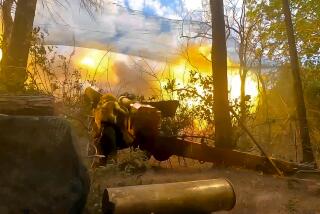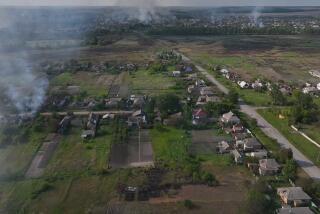Rebels in Chechnya Are Defending City in Ruins
- Share via
GROZNY, Russia — Rebel fighters here live in the basements of bombed-out buildings and travel underground through a network of tunnels. Doctors operate on the wounded without anesthetic. Civilians, afraid to venture out, bury their dead in the courtyards of their apartment buildings.
Daily bombardment by Russian aircraft and artillery has so devastated the capital of Chechnya that when the war ultimately ends, there will be few homes left standing for those who wish to return.
For the rebels, life is guerrilla warfare. For civilians, it is a test of survival.
Despite heavy losses, morale appears high among the 2,500 to 3,000 rebel fighters encamped in this ruined city. They swear they will not give in to the “Russian aggressors,” and they predict the war will continue for many months.
“The Russians can destroy our city, they can reduce it to rubble, but they will never be able to seize it and control it,” said Vakha Israilov, 27, commander of a Chechen battalion fighting in Grozny. “We will never lay down our arms.”
The battle for Grozny began when Russian troops launched their assault Dec. 25, but federal soldiers have made little progress in driving out the rebels. As Russia attempts to retake the separatist republic it lost in a bloody 1994-96 war, it risks repeating costly mistakes.
The Russians regularly claim they have captured various districts of the city, but it is unclear how much of it they actually hold.
Acting President Vladimir V. Putin, who rose to popularity while prime minister last fall by leading Russia into the second Chechen war, is banking on a successful military campaign to help him win election to the presidency this spring. That is not lost on the Muslim rebels, who are doing their best to wreck Putin’s plans.
“It is clear that the Russians are bogged down up to their ears in the war in Chechnya,” said Ruslan Makhmayev, 35, a unit commander. “And there is no chance the war will be over before March 26, the day of the presidential elections in Russia. What Putin expected would bring him to power will in fact become his undoing.”
Putin portrays the Chechen rebels as “terrorists and bandits” who engage in kidnapping for profit and behead their victims when ransom is not paid. The rebels cast themselves as freedom fighters battling to liberate their republic from 150 years of repressive rule from Moscow.
In Grozny, the fighters appear upbeat and cheerful. They seem well fed and well groomed, given their circumstances. In one basement fortification, they have built a sauna. They obtain water from natural springs nearby and heat their subterranean dwellings with wood-burning stoves.
Many of the Chechen rebels fought in the first Chechen war, unlike most of the young Russian soldiers they are facing. They say they are well prepared for a long siege and have enough food and ammunition to last indefinitely. They add to their stores with munitions they take from the Russians.
The biggest shortage is of anesthetics and medicine in the three city hospitals where doctors operate on the wounded.
“The only thing that we do not have in abundance is anesthetics,” Makhmayev said. “Our hospitals are in need of medications. Over the past few days, our doctors have had to perform surgeries without any anesthetics.”
In the city’s Oktyabrsky district, which is under the control of Chechen forces, no building has escaped damage from Russian bombs. Many have been reduced to cement hulks.
Smoke rises from scattered fires, and a haze hangs over the city. Falling snow mingles with ash and turns gray before it reaches the ground. Stray dogs and cats roam the streets in search of something to eat.
An estimated 8,000 to 25,000 civilians remain in the city, most of them hiding in basements. There is little food. Those who venture onto the streets do so only because they have to. Most of the civilians are elderly Russians who lack the means or clan ties that would help them escape the city.
“The losses among civilians are tremendous, and most of them are ethnic Russians,” said Avalu Saydayev, 30, commander of a rebel reconnaissance platoon. “The federals are killing their own people.”
The rebels have turned apartment blocks and government buildings into fortresses, strengthening their hide-outs with concrete and logs. Within each city block, they have connected adjoining buildings by breaking through the first-floor walls, allowing the fighters to move freely from one building to another without going outside. They travel around Grozny through a maze of utility tunnels built during better times, popping up in unexpected places to ambush Russian soldiers.
“The Russians can’t understand why they keep pounding the city but nothing happens to us,” Saydayev said. “The federal troops have turned the city into a pile of rubble--the people who used to live in Grozny will have nothing to return to. City courtyards have been turned into cemeteries.”
While the Russians measure their success by the districts they claim to have captured, the Chechens are fighting with the aim of inflicting maximum casualties. Their strategy is to yield territory to the Russians and then pick them off as they advance. Russia says it was a Chechen sniper who shot and killed a top Russian general a week ago as he exhorted his nervous troops to move forward.
Both sides claim to have inflicted huge losses on their enemies while suffering few casualties themselves. Chechen commanders say they sustained the worst losses in a single day a week ago, when 63 guerrillas were killed in intense fighting.
For the rebels, the most devastating losses have come from the Russian bombing, not combat, Makhmayev said.
“Russian troops prefer not to engage in close combat with us,” he said. “As soon as a firefight starts, they immediately back off and call in aircraft or artillery. They prefer to bomb and not to fight.”
During the first Chechen war, the Russians stormed Grozny and seized the city, but at a huge cost in lives. They held the city for more than a year, but the outnumbered rebels returned and drove them out.
The Chechens are preparing for this war to follow the same pattern. Sooner or later, they expect government troops to gain the upper hand in Grozny. Then the surviving rebels will retreat into the Caucasus Mountains to the south, where other rebel forces also are battling Russian troops. They will regroup and strike when the time is right.
The Islamic fighters scoff at Russian claims that federal troops have Grozny surrounded.
“We will suffer no losses while pulling out of Grozny because we know the roads that are not controlled by the Russians,” said Israilov, the battalion commander. “Their statements that Grozny is encircled and sealed are nothing but a figment of the imagination. We can enter and leave the city whenever we want. We send our wounded warriors out of Grozny every day.”
Abusalman Akhyadov, 49, head of Chechnya’s National Security Service, the equivalent of the local KGB, said pulling out of Grozny will not constitute a rebel defeat. Rather, he said, it will mark the beginning of “the real war.”
“With the fall of Grozny, the war will enter its main stage, and this is when the Russian aggressors who have stayed alive will envy those who were already killed in combat,” said Akhyadov, who was a top commander during the first war. “We will turn this land into real hell for Russians. The Russians should remember their lessons from the previous war--Chechens never surrender.”
*
Special correspondent Nunayev reported from Grozny and Times staff writer Paddock from Moscow.
More to Read
Sign up for Essential California
The most important California stories and recommendations in your inbox every morning.
You may occasionally receive promotional content from the Los Angeles Times.













